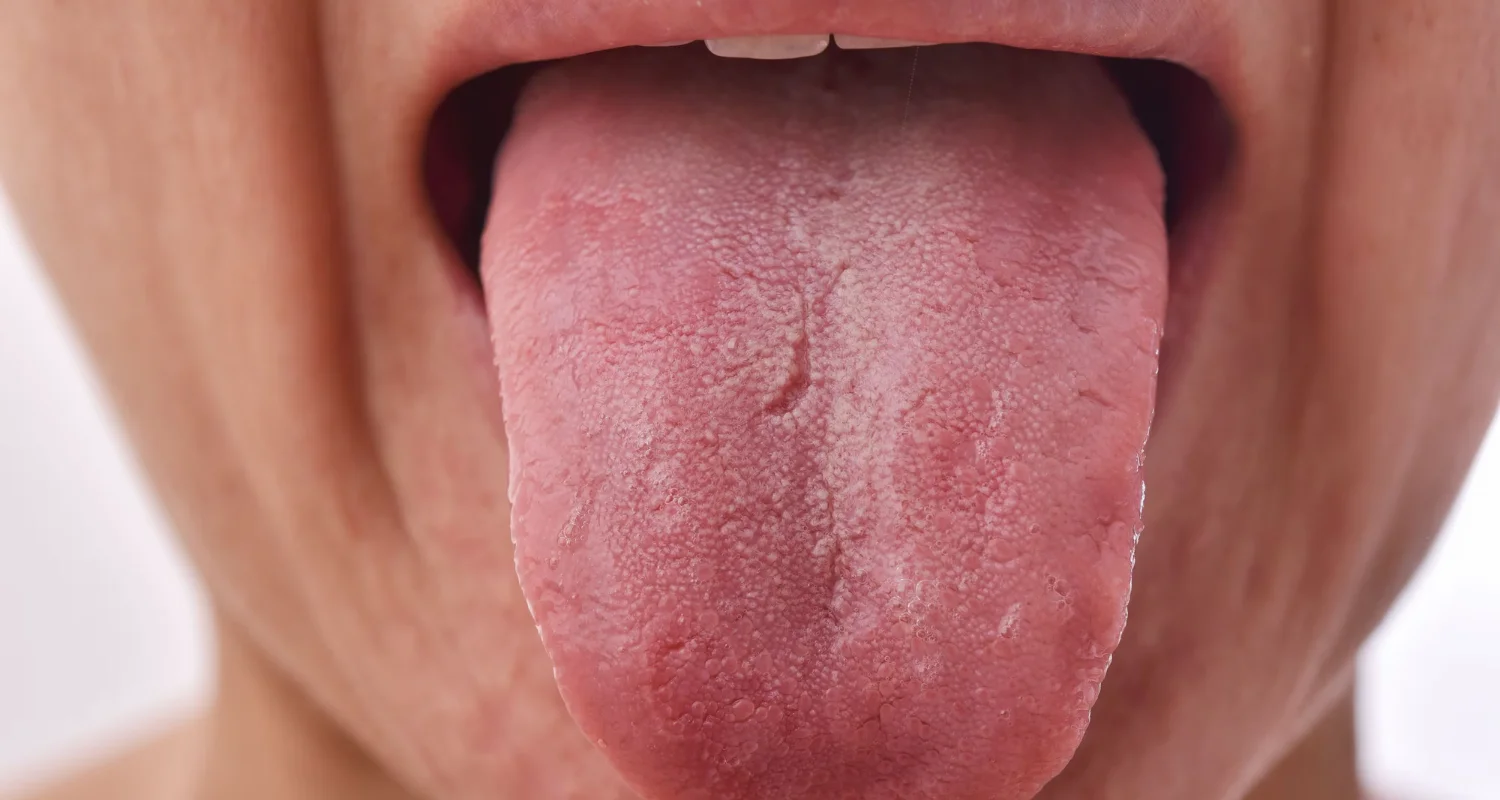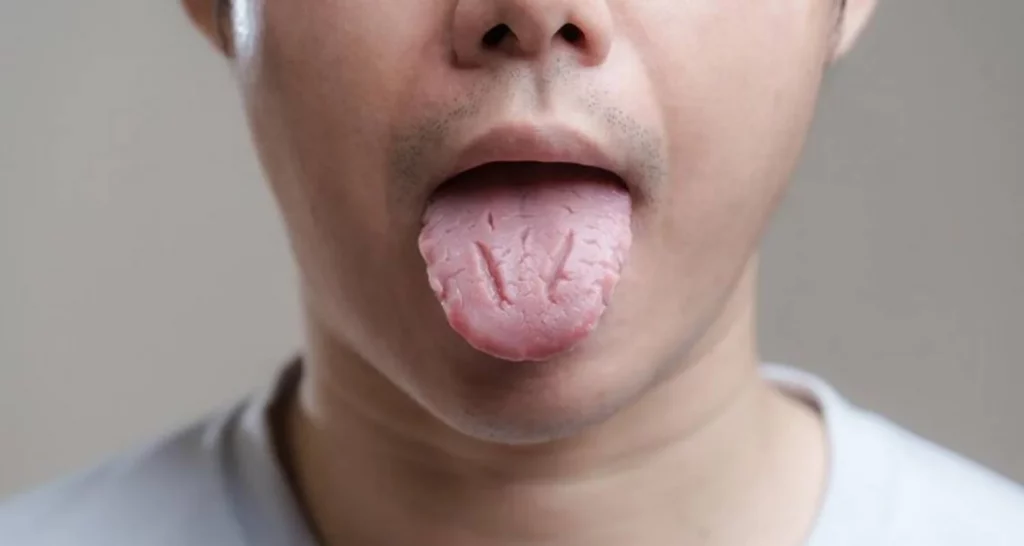Last Updated on: 27th December 2025, 05:52 am
Fissured Tongue Treatments: Complete Guide
The tongue plays a fundamental role because it perceives flavors, complements chewing, and articulates words and sounds; therefore, maintaining a healthy tongue is vital for general health. Being such a complex organ, multiple conditions and diseases can affect its proper functioning. In this article, we will explore one of the most common conditions: a fissured tongue. Join us to learn about its clinical management, prevention, and alternative treatments.
What is a Fissured Tongue?
Fissured tongue, scrotal tongue, or plicated tongue, is a condition characterized by the appearance of fissures, cracks, or clefts in the dorsum of the tongue, where the taste buds are located; it is usually in the middle or anterior portion. It is an asymptomatic condition, that is, it does not cause pain.
What Causes Fissured Tongue?
Although a cleft tongue can appear spontaneously and without an apparent association, it can be associated with the consumption of some medications or foods, vitamin deficiency, and medical conditions, among which the following stand out:
● Pernicious anemia
● Psoriasis
● Acromegaly
● Macroglossia (Increased tongue size)
● Oral-facial-digital syndrome type I
● Pierre Robin syndrome
● Down syndrome
● Melkersson Rosenthal Syndrome.
The use of removable dentures may also be related to their appearance, especially when there is inadequate oral hygiene.
Who can have a Fissured Tongue?
Cleft tongue affects 10 or 20% of the population, primarily men. It is much more common in older people.
Is Fissured Tongue a Contagious Condition?
This lingual abnormality can cause confusion and worry. However, it is important to note that a cleft tongue is not a contagious disease in itself. Rather, it is a benign condition that can arise due to a combination of genetic environmental factors – sometimes allergies or food sensitivities. Although its appearance can be disturbing, a cleft tongue is not transmitted from person to person through direct contact.
Oral Hygiene Habits of Caring for a Fissured Tongue
The structure and shape of the tongue represent a challenge for correct oral hygiene; as it is an organ with soft tissues and an irregular surface, its cleaning must be exhaustive and careful. Below, we offer you 5 tips for effective hygiene of your tongue:
1. Use tongue scrapers or toothbrushes with integrated tongue cleaner as follows:
a. Position the tongue scraper or cleaner as far back as possible.
b. Start with sweeping movements from back to front. To control your gag reflex, exhale deeply through your mouth.
c. The sweeping movements must be consistent and uniform. The cleaning will be complete when your tongue has a uniform pink color or, failing that, it is free of bacterial plaque.
2. Use mouthwashes: Mouthwashes are a good complement to oral hygiene. Although their use is not essential, they can be effective in the treatment, prevention, and care of a cleft tongue. We recommend the use of alcohol-free rinses with natural compounds such as aloe vera, calendula, and chamomile, among others.
3. Brush your teeth and floss: Correct brushing promotes effective control of the biofilm present in the mouth. Biofilm can trigger diseases such as cavities or periodontitis, which indirectly affect the tongue.
4. Avoid using alcohol mouthwashes: The alcohol present in some mouthwashes worsens a cleft tongue, causing pain and irritation. Consult with your dentist about the most appropriate option on the market for your particular case.
5. Keep hydrated: Saliva is essential to maintain the well-being of the tongue and oral tissues; Its composition is largely water, so staying hydrated favors its production and secretion.
Prevention of a Fissured Tongue
It is essential to understand that the severity of a cleft tongue can vary, so its treatment will vary with each case. When it is mild, the condition manifests the appearance of shallow and narrow grooves; when it is severe, deep and painful indentations appear.
Some general tips to prevent and care for a cleft tongue:
● Avoid spicy, acidic, irritating, or overly seasoned foods.
● Avoid or moderate the consumption of alcoholic beverages, energy drinks, and carbonated drinks.
● If you suffer from a condition that reduces saliva secretion, use artificial saliva supplements and/or sugar-free gum to stimulate its production.
● Avoid or moderate the habit of smoking.
● Maintain strict oral hygiene
● Visit your dentist every 6 months for a general assessment.
Fissured Tongue Treatments You Should Know
Although there is no specific medication designed exclusively to treat a cleft tongue, some approaches should help relieve discomfort and reduce symptoms. Mouthwashes with mild, alcohol-free solutions can provide temporary relief and help maintain oral hygiene.
Additionally, antifungal medications or topical steroids may be prescribed in cases of infection or associated inflammation. However, it is crucial to consult a medical or dental professional for an accurate diagnosis and a personalized treatment plan to address a cleft tongue effectively.
Conclusion
● Cleft tongue is a condition that can be influenced by genetic, environmental factors, and food sensitivities.
● Proper management includes specific oral hygiene practices, such as tongue scrapers, mild mouthwashes, and avoiding irritating products such as alcohol rinses. These simple tips will help maintain oral health and reduce the symptoms associated with this condition.
● While there are no medications designed exclusively to treat cleft tongue, some pharmacological approaches may provide temporary relief. However, it is crucial to seek the guidance of a dental health professional for an accurate diagnosis and personalized treatment plan.
Frequently Asked Questions
Can a cleft tongue be removed?
Normally, a cleft tongue does not need treatment as it often has no symptoms. It is common for people to be unaware that they even have this condition until it is identified by a dentist during a routine check-up.
What vitamin deficiencies cause fissures in the tongue?
A fissured tongue can be the result of chronic trauma and deficiencies in certain nutrients. A lack of iron (iron deficiency anemia), as well as deficiencies in vitamin B2, folic acid, vitamin B12, and zinc, can cause a burning sensation on the tongue.
How long does it take for a cleft tongue to heal?
A fissured or cracked tongue does not necessarily require medical intervention, as it usually heals spontaneously after a period. The length of recovery varies depending on how regularly you practice oral hygiene, including brushing, flossing, and using mouthwashes. Greater attention to oral cleanliness can speed up the healing process.
Share:
References
1. AAOM Office. (May 13, 2015). Fissured tongue. Aaom.com. https://www.aaom.com/fissured-tongue
2. Bakshi, S. S. (2019). Fissured tongue. Cleveland Clinic Journal of Medicine, 86(11), 714–714. https://doi.org/10.3949/ccjm.86a.19060
3. Burch, K. (Mar 1, 2023). Fissured tongue: Definition, symptoms, cause, treatment. Verywell Health. https://www.verywellhealth.com/fissured-tongue-7113420
Fissured tongue. (Mar 20, 2023). WebMD.https://www.webmd.com/oral-health/fissured-tongue
4. Fletcher, J. (Nov 21, 2019). Fissured tongue: Causes and treatment. Medicalnewstoday.com. https://www.medicalnewstoday.com/articles/327089
5. Mangold, A. R., Torgerson, R. R., & Rogers, R. S., III. (2016). Diseases of the tongue. Clinics in Dermatology, 34(4), 458–469. https://doi.org/10.1016/j.clindermatol.2016.02.018
6. Roth, E. (Sep 7, 2012). Fissured tongue: Pictures, symptoms, causes & more. Healthline. https://www.healthline.com/health/fissured-tongue
-
Nayibe Cubillos M. [Author]
Pharmaceutical Chemestry |Pharmaceutical Process Management | Pharmaceutical Care | Pharmaceutical Services Audit | Pharmaceutical Services Process Consulting | Content Project Manager | SEO Knowledge | Content Writer | Leadership | Scrum Master
View all posts
A healthcare writer with a solid background in pharmaceutical chemistry and a thorough understanding of Colombian regulatory processes and comprehensive sector management, she has significant experience coordinating and leading multidisciplina...


















